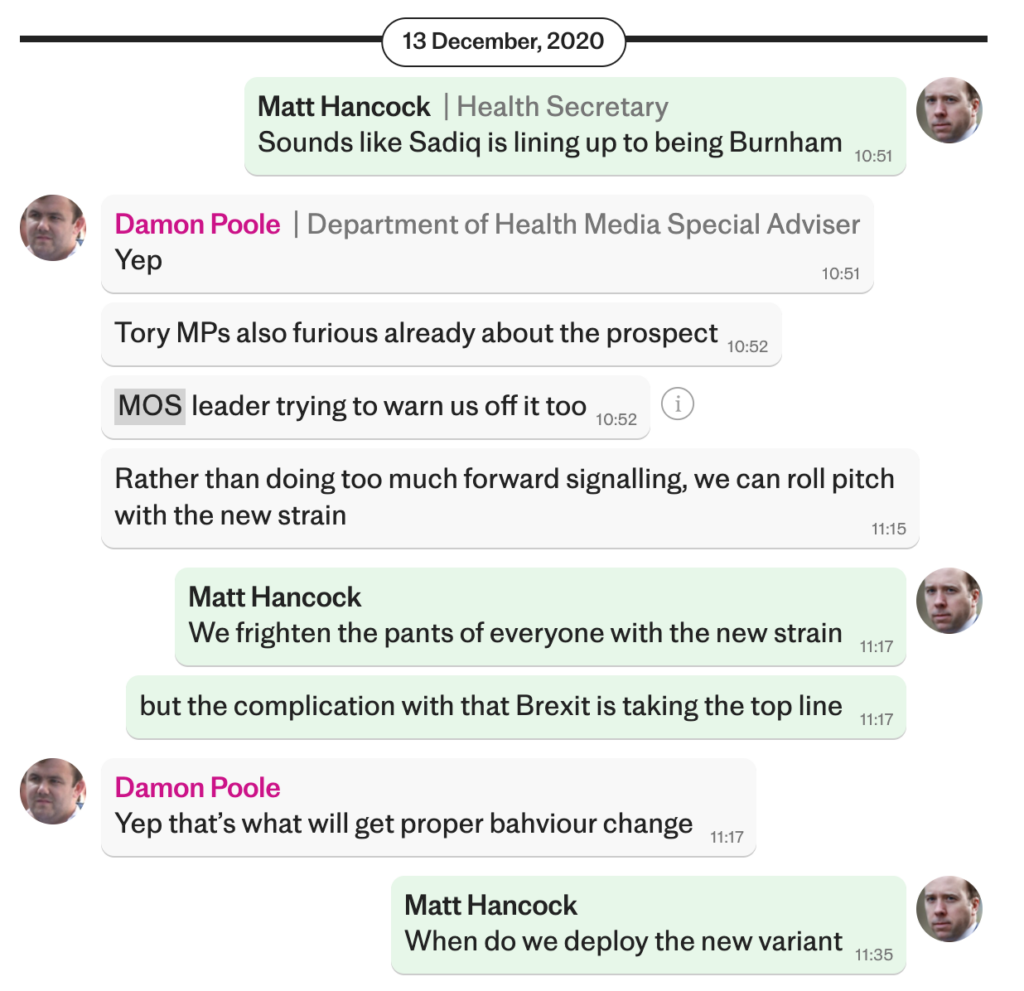The latest of the Telegraph’s ‘Lockdown Files’ has arrived, and impressively it is even more damning than the previous instalments. Here’s an excerpt:
Throughout the course of the pandemic, officials and ministers wrestled with how to ensure the public complied with ever-changing lockdown restrictions. One weapon in their arsenal was fear.
“We frighten the pants off everyone,” Matt Hancock suggested during one WhatsApp message with his media adviser.
The then Health Secretary was not alone in his desire to scare the public into compliance. The WhatsApp messages seen by the Telegraph show how several members of Mr. Hancock’s team engaged in a kind of ‘Project Fear’ in which they spoke of how to utilise “fear and guilt” to make people obey lockdown.
As with the other revelations, it is shocking yet not surprising. We knew they were doing this, but there’s something truly grotesque about seeing the contempt they had for people laid bare. The absolute disregard for freedom, and worse, the revelling in this exercise of power by the likes of Simon Case, the Cabinet Secretary, who found forcing travellers to quarantine in shoebox hotel rooms “hilarious”.
It is a toss up between Hancock and Case for the title of the Lockdown Files’ Greatest Villain. I was considering awarding it to the wretched Case until this latest round of files dropped, and Hancock went full Dr. Evil with his question: “When do we deploy the new variant” [sic].

Of course we shouldn’t let the unintentional comedy of Hancock’s messages (one has him text shouting “SOMEONE INSTALLED A CAMERA IN MY OFFICE WITHOUT TELLING ME!”) distract from how appalling his actions were.
How far Boris should be excused is another question. Throughout the Lockdown Files he shows his instinct for freedom, but lacks the courage to convert that into policy. This latest episode is no different, as the Telegraph reveals:
Boris Johnson, then the Prime Minister, had promised that families would be reunited at Christmas – the first since the pandemic struck in early 2020. He said foregoing long-awaited reunions “would be inhuman and against the instincts of many people in this country”.
But behind the scenes, his ministers and officials were increasingly aware that vast swathes of the public faced a grave disappointment and that the Johnson administration would take the blame for their frustration.
The solution in December was “to frighten the pants off everyone” with a declaration of a new strain of COVID-19, known as the Alpha or Kent variant.
In a conversation between Mr Hancock and Mr Poole on Dec 13th, the pair discussed how to survive the coming backlash and storm. On the day, there were 18,409 cases of Covid recorded and 410 deaths. Five days later, on Dec 18th, Mr. Johnson would scrap his planned five-day Christmas amnesty in an about turn.
Every time I think I have hit peak anger with this ongoing saga, the messages reveal a new low.
The bizarre power given to chancers “Slackie and Lee” (James Slack and Lee Cain in the Downing St comms team) to dictate policy; Simon Case’s nauseating glee at imposing petty restrictions, and his characterisation of the desire to retain basic privacy around one’s contact details as “pure Conservative ideology”; Boris’s claim that another lockdown would be the “height of absurdity”, before immediately implementing it – I could go on.
But Hancock’s brazen fear tactics, apparently divorced from any kind of scientific evidence, deployed, to use his word, with borderline psychopathic disregard for the impact they would have on people, is the worst finding yet in this already incredibly sordid tale.












To join in with the discussion please make a donation to The Daily Sceptic.
Profanity and abuse will be removed and may lead to a permanent ban.
It’s really disheartening that reality no longer seems to matter, either to politicians or the media who are supposed to hold them to account. Anecdotally I feel like a majority of people now believe many of these complete falsehoods, as a consequence of media and political stupidity / wilful ignorance:
Wind and solar are the cheapest form of energy and can supply all of our electricity needs;
The oil and gas industry benefits from billions of dollars of government subsidies, paid for by the hard-working tax payer;
Battery technology is following some kind of Moore’s Law in terms of cost and performance;
Nuclear is not a viable option.
At some point we have to ask how did we get to a point where literal fiction is mainstream opinion and policy.
I don’t understand this comment: Wind and solar are the cheapest form of energy and can supply all of our electricity needs.
To supply the need for reliable electrical power from wind and solar, we’d have to figure out how to fan-in and fan-out it from a mass of unreliable sources, over an unreliable network, and feed power reliably where we want it to go. Trust me, we don’t have, and never have had those smarts beyond a few power-stations and pylons and substations. That’s sheer hubris.
I’m listing this as one of the things that is ridiculous/ impossible, not saying it’s true.
It appears that Watermelons author James Delingpole’s Twitter account has been nuked.
Does anybody have any idea why?
That’s a great shame but actually think he’ll be fine his following mostly will have been long weened off tw@tter.
As an ex power pricing analyst electricity is sold in the commercial market not just the amount but also the shape of the consumption curve. Very few industries have a constant demand it varies throughout the day, so value in energy comes from being able to meet peak demands/deal with variability. In the old days we would buy green energy strip it if it’s green credential then sell it on for buttons because it was fundamentally useless due to the intermittency issue. This is how large companies were/are able to claim they use only renewable energy.
These are all very legitimate points. The problem is much of this is based on old normal political systems.
This is the new normal where a cadre of power brokers are artificially increasing energy prices through regulation, carbon credit systems, carbon taxation, decommissioning of old petrochemical and in some cases nuclear infrastructure, and I would argue conflict creation with Russia and self-damaging sanctions.
As long as these evil swine keep attempting to increase energy prices through supply shocks, the viability of these crony green slush projects like wind and solar will attract capital, capital that those closest to the gravy trains have already started equity funds to siphon money into.
Until this scam is seriously brought to the front of the publics consciousness and there are viable political actors willing to take them on, perhaps after civil disorder and riots, I think these ‘schemes” will indeed be viewed as the future.
They probably missed a trick when they renamed a department that had “climate change” in it’s name! When it comes to the physical availability of LNG, it appears that the UK is in a better position than some. I think there has been a fair bit of investment in the facilities to store it and churn out gas, such as in Pembrokeshire, west Wales.
The real cost of “renewable energy” was the reason Government deliberately prevented exploration for gas through fracking and the Bank of England discourage investing in both oil and gas projects, in order to force up the price of gas and oil.
“Renewables” is a lie. “Unreliables” is more accurate.
Electricity generation used to be based on a sensible heirarchy of technologies from baseload to peak. The recent insertion of unreliables into the mix has disrupted that. Disruptive technology is part of the plot. So is the perversion of language.
“Renewables” would be more accurately described as “Unreliables”
The authors were right to point out that previous spikes in oil and gas prices were temporary. This is because an increase in price would give fossil fuel companies more money plus an incentive to invest in increased production which would sooner or later lead to more supply and lower prices.
Unfortunately current policies don’t do this. Windfall taxes on oil and gas firms reduce the amount that can be invested in new wells or developing new oil/gas fields.
More importantly governments in Europe and the U.S. are generally becoming more hostile to fossil fuels. Even if there is a temporary reduction in hostility due to worries of short term supply, the long term trend is obvious to fossil fuel companies. This makes them reluctant to invest large sums of money in developing new fields that may be in production for decades, as they can’t be sure these fields will be allowed to stay in production long enough to pay back the initial investment.
This makes me think that the past, i.e. price spikes being fairly short lived, may not be a reliable guide to the future as the market has been fundamentally changed by government intervention.
This doesn’t mean I think that renewables are now a good idea, instead it seems obvious that governments such stop interfering in the market.
Don’t tell Greta, but I hear there’s still a lot of coal under Britain. Just saying.